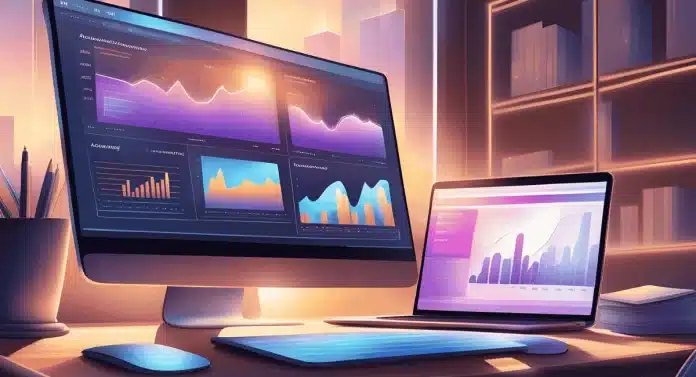Due to some similarities, many people find it difficult to distinguish ERP systems from accounting software. Despite the similarity in terms of functionality, they are basically different software.
But, with the right software, you are able to manage your business in a better way, especially with the best software for ERP from HashMicro. Therefore, This article will explain the difference between ERP and accounting systems.
Table of Content:
Table of Content
What is ERP System?

An ERP (Enterprise Resource Planning) system is a concept for planning and managing company resources. ERP system is a business process management software that manages a company’s financials, supply chain, and other company operations.
This system consists of an integrated programming package and multiple modules designed to support various company processes. Besides that, this system also can increase operational efficiency while increasing consumer service.
It emphasizes planning, resource analysis, purchasing management systems, sales, accounting, and inventory. Additionally, the ERP system also can emphasize human resource management such as staffing and employee payroll calculations.
In general, ERP systems can run almost all operational activities that exist within the company. Everything is run automatically and connected to each other. A warehouse or inventory division can see an increase in the number of items when the accounting department creates a purchase invoice.
The accounting division can automatically see the published journal and the finance division can see the newly increased expense. Corporate managers have access to all reports from all departments.
From retail and wholesale to industrial and educational institutions, a solid ERP system may be easily adaptable to a variety of company and industry models. This system helps companies by decreasing human error, giving crucial information in real-time, and assisting management in decision-making.
In addition, an ERP system also can help companies by addressing consumer complaints, increasing corporate productivity, and preserving inventories.
Why Your Companies Should Use ERP System?
Companies should use an ERP (Enterprise Resource Planning) system for a variety of reasons, including:
- Improved Efficiency: ERP systems can streamline and automate business processes, reducing the need for manual data entry and repetitive tasks. This can save time and reduce the risk of errors, improving overall efficiency.
- Better Visibility: ERP systems provide a centralized platform for managing business operations, providing real-time data and analytics on key performance indicators. This can help businesses make better-informed decisions and respond more quickly to changes in the market.
- Enhanced Collaboration: ERP systems enable collaboration and communication across different departments and teams, helping to break down silos and promote cross-functional teamwork.
- Scalability: ERP systems are designed to be scalable and adaptable, allowing businesses to add or remove modules as needed to meet changing business requirements.
- Improved Customer Service: ERP systems can provide a comprehensive view of customer data and interactions, enabling businesses to provide more personalized and effective customer service.
- Cost Savings: By automating processes and reducing the need for manual data entry, ERP systems can help reduce labor costs and improve productivity. They can also help businesses optimize inventory management, reducing the risk of overstocking or stockouts.
- Compliance: ERP systems can help businesses stay compliant with industry regulations and standards, such as financial reporting requirements, data privacy regulations, and environmental standards.
Overall, an ERP system can help businesses streamline operations, improve decision-making, and reduce costs, while also enhancing collaboration and customer service. With its many benefits, it’s no wonder that ERP systems have become a key tool for businesses of all sizes and industries.
What is Accounting Software?

Accounting software is a program designed specifically to facilitate the accountant’s work in recording business transactions that are usually done manually, such as purchases, sales, payroll, ledgers, and various other accounting activities to produce financial statements as a consideration in the decision-making process.
Accounting software helps an accountant create financial statements such as balance sheets, ledgers, trial balances, cash flow statements, profit and loss statements, tax audit files, etc.
This software provides many benefits for the company, such as accelerating the work of financial statements, avoiding miscalculations, improving job efficiency, automating various transactions, assisting companies in decision-making by presenting accurate data, and figuring out the financial condition of the company at any time in real-time.
Also read: 7 Key Benefits of Using an Accounting System in Your Company
Why Your Company Should Use an Accounting Software?
Your company should use accounting software for a variety of reasons, including:
- Improved Accuracy: Accounting software can help reduce the risk of errors and inaccuracies by automating calculations and providing built-in checks and balances. This can help ensure that financial data is accurate and reliable.
- Time Savings: Accounting software can automate many time-consuming tasks, such as data entry, bank reconciliations, and financial reporting. This can save time and allow your team to focus on more strategic tasks.
- Real-time Visibility: Accounting software provides real-time data and analytics on key financial metrics, such as revenue, expenses, and cash flow. This can help you make better-informed decisions and respond more quickly to changes in the business environment.
- Scalability: Accounting software is designed to be scalable and adaptable, allowing you to add or remove modules as your business grows and your accounting needs change.
- Improved Compliance: Accounting software can help you stay compliant with industry regulations and standards, such as tax reporting requirements and financial reporting standards.
- Better Collaboration: Accounting software can facilitate collaboration across different teams and departments, such as finance, operations, and sales. This can help break down silos and improve cross-functional teamwork.
- Cost Savings: Accounting software can help reduce costs by automating processes, improving efficiency, and reducing the risk of errors and financial discrepancies.
Overall, accounting software can help your company manage finances more efficiently and effectively, providing real-time data and analytics, improving accuracy, and reducing costs. With its many benefits, it’s no wonder that accounting software has become an essential tool for businesses of all sizes and industries.
Differences Between ERP Systems and Accounting Software
The difference between ERP and accounting systems lies in the needs of each company. ERP systems are usable by many divisions in the company, and each employee uses them by granting access to use it. While accounting software in general is usable for accountants or finance divisions.
In summary, while accounting software focuses primarily on financial management, ERP software offers a comprehensive solution that integrates various business functions to streamline operations, improve efficiency, and support organizational growth.
Before deciding on which software you should use, you must know your company’s needs. If the company only needs automation for the accounting department, then using accounting software is enough. However, if the company wants to automate every operational activity, the ERP system is the right choice.
Companies also need to consider in terms of costs. ERP systems that present complete solutions for various departments, including accounting, are more expensive than accounting software that can only handle one division.
Suppose the company is already sure about which software to choose. In that case, the next step is to choose the right software solution provider. Furthermore, decide whether to use conventional or Cloud-based systems (applicable to both ERP and accounting).
Conclusion
There are many differences between ERP and accounting systems. Usually, only accounting and finance divisions use accounting software, while all divisions within the company can access ERP systems.
The most crucial difference between ERP and accounting systems is that ERP consists of many integrated modules to help business performance, especially accounting, become efficient. While accounting software only contains accounting modules and is usually difficult to integrate with other systems in the company.
Suppose you only automate some of the work in your business. In that case, this can lead to new problems that can hinder the company’s performance. This non-maximal automation only causes losses and consumes time and effort in vain. Therefore, HashMicro’s ERP system can be your choice to automate all business processes in your company optimally and efficiently.
Hash CORE ERP is the best ERP software in Singapore that can help you to streamline your business processes and drive your company’s growth significantly. This software is a complete system that contains integrated modules to facilitate easy data access and avoid human error.
This ERP system also provides accounting modules that can improve how you record transactions, costs, and expenses. Using this system, you do not need to waste a lot of time and effort managing corporate accounting. In addition, You can customize this software according to the company’s needs. Therefore, immediately switch to Hash CORE ERP to make the best decision and increase company profits.
You can choose the right ERP vendor after calculating the ERP software pricing scheme. Tell us about your type of business and industry and we will offer you the best business solutions. If you want to get a free demo of our tour product, click here!





































